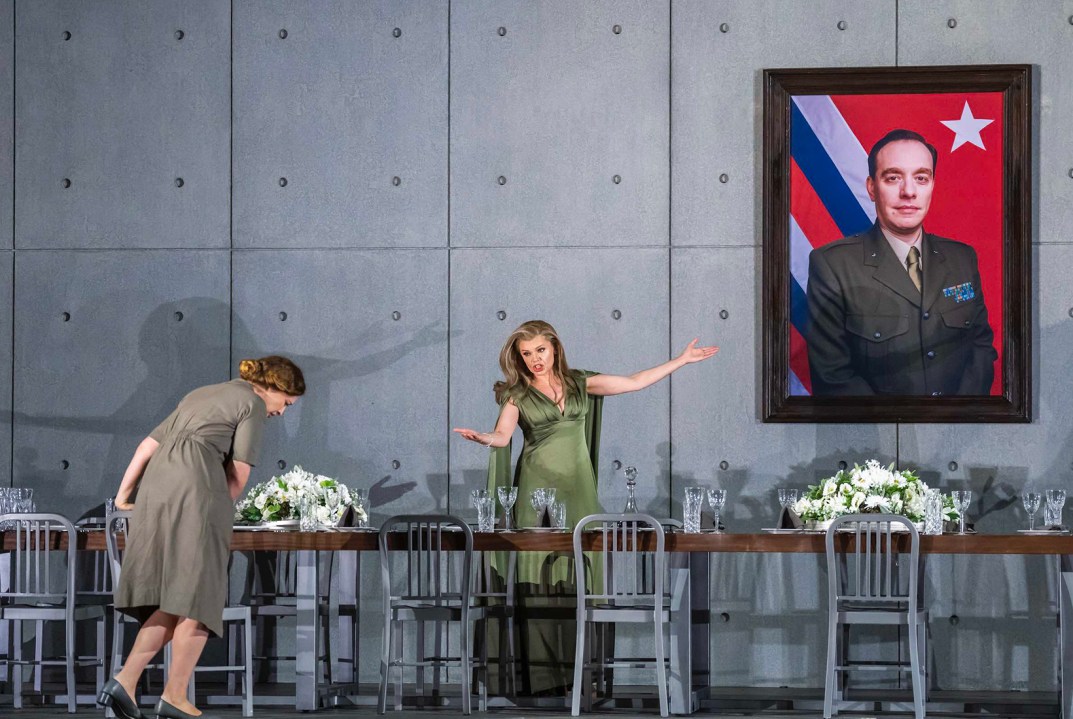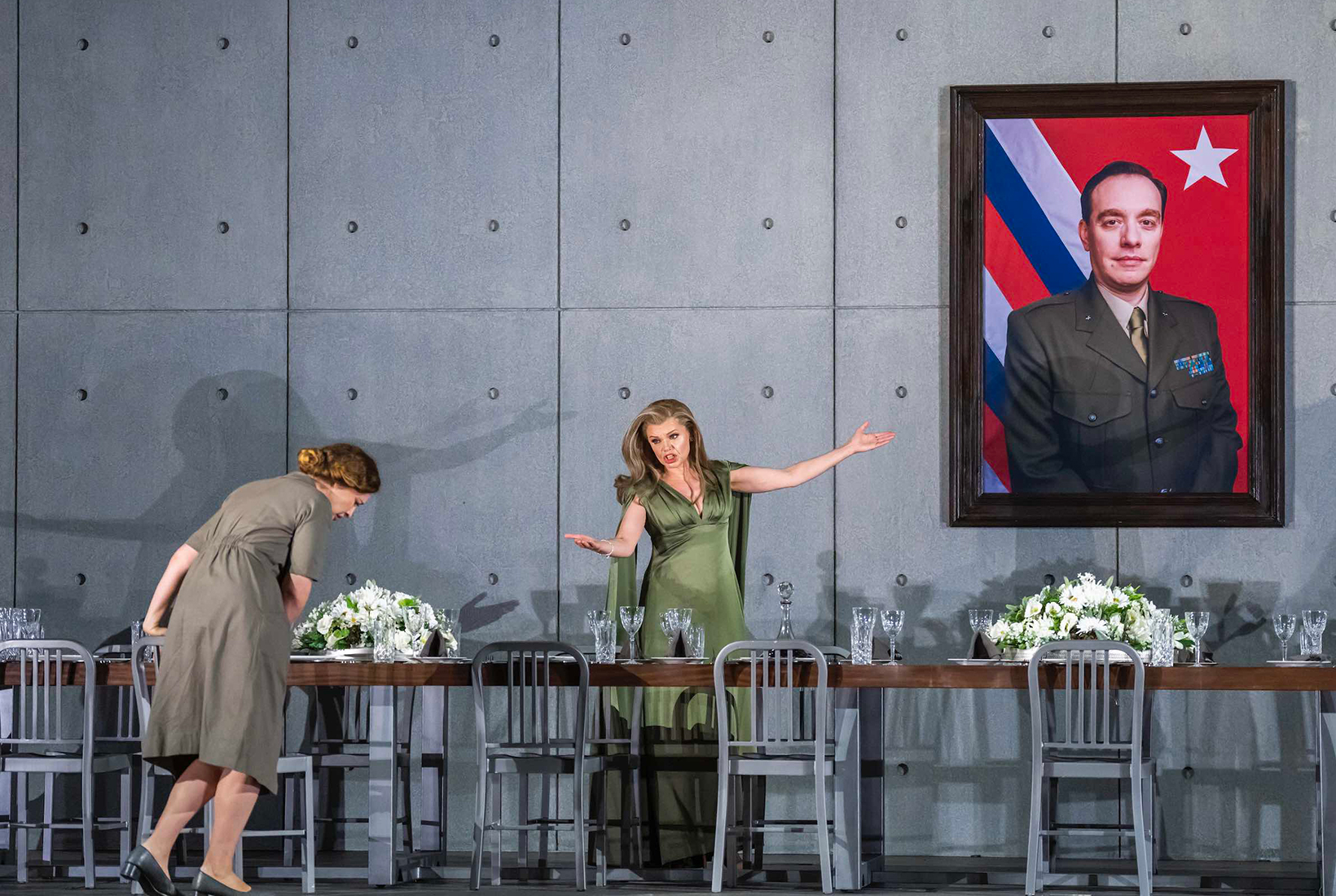Grey. More grey. So very, very grey. That’s the main visual impression left by Robert Carsen’s new production of Verdi’s Aida. Possibly a few older operagoers still think of Aida as a fabulous spectacle: horses, temples, caparisoned elephants and all the gilded splendour of the Pharaohs. But if you cut your opera-going teeth more recently than 1990 – and unless you’re going to one of the more lavish Ellen Kent efforts – you’ll know by now to expect nothing of the sort. Carsen places the drama within the towering walls of a government bunker in some unspecified modern military dictatorship, with the cast (even Aida and Amneris) dressed almost entirely in shades of khaki.
I say ‘unspecified’, but much of the imagery (flag-draped military funerals with shiny American coffins; back projections of smart-bomb footage) seemed to derive from the Iraq war, and the only recognisable flag was the Stars and Stripes. Obviously there haven’t been any more recent, more relevant instances of military aggression in the world. Verdi’s ballet sequences, meanwhile, were filled with leaping dancers in combat fatigues, inevitably evoking Madame Mao. After the virtuoso public ceremonial of the last month, it’s not a great time for singers and dancers to attempt military drill on stage. We’ve seen how the professionals do it, and far too recently.
Dean’s orchestra shimmers, pulses and emits eerie, sinking microtonal groans
But overall, designer Miriam Buether’s concrete blast walls make a suitably monumental substitute for pylons and pyramids, and the real problem is Carsen’s failure to generate any sense of intimacy at the heart of the epic setting. Left to themselves, characters gesticulated stagily at the audience, or stood far apart, isolated in the cavernous spaces. Too often, Amneris’s hatred (and Agnieszka Rehlis gave a wonderfully feline portrayal of toxic entitlement, swirling her silk cape as she prowled downstage) fizzled in the void; and such physical spark as flickered between Francesco Meli’s underpowered Radamès and Elena Stikhina’s Aida was never likely to set any passions aflame. They spent much of their final liebestod at opposite sides of the set, an underground bomb store.
This was a pity, because whatever the merits of the staging – and once you adjust for the drabness, it’s quite stylishly done – there were some fine lead performances, as well as thunderous choral singing and pacey, punchy conducting from Sir Antonio Pappano. Rehlis I’ve mentioned; but Soloman Howard made a thrillingly sombre and majestic Ramfis and even Meli – after a ‘Celeste Aida’ that sounded as though it was squeezed from a toothpaste tube – seemed to go up a gear after the interval. The big story, though, was Stikhina. She can convey defiance and vulnerability in a single, unaffected gesture. And boy, she can sing: so expressively, and for such extended stretches that when that tender soprano suddenly flared up to fortissimo it seemed to flood the whole theatre with light. She sounded as gorgeous in her death scene as she did in Act One; not a note sounds forced. It’s a voice to drink in and savour. Carsen could, and should, have made more of her.
Anyway: if you wanted to draw broader cultural conclusions (and where’s the fun if you can’t?), the grey-suited republican bombast that Carsen reproduces with such accuracy makes an instructive contrast with our recent shared experience of state ceremonial. How empty – how ugly – it all looks beside the colourful, multilayered humanity of the monarchical alternative. In a similar vein, you might remember an argument that used to come up a lot, back when New Atheism was at its height. If religion is rot, you’d say, explain the ‘Missa Solemnis’ and the Sistine Chapel. Ah, came the response: but why shouldn’t scientific truth inspire art that’s every bit as beautiful?
The composer Brett Dean has risen to that challenge with In This Brief Moment, a 50-minute cantata for the City of Birmingham Symphony Orchestra plus chorus and soloists (Jennifer France and Patrick Terry), conducted by Nicholas Collon. It’s a secular riposte to Haydn’s The Creation and Matthew Jocelyn’s libretto incorporates chunks of Darwin’s Origin of Species. ‘Let the strongest live and the weakest die,’ intones the choir, ominously.
It is all quite brilliantly handled. Dean’s orchestra shimmers, pulses and emits eerie, sinking microtonal groans. Few living composers could handle a large-scale structure with such mastery of texture as well as pace, and the choral and solo singing in this world première performance was virtuosic in the extreme. Emotionally, it’s reptilian in its coldness, with ecological idealism cloaking a deadly void where the compassion should be. Perhaps that was the point. Humans do eventually enter Dean and Jocelyn’s schema as the subject of an extended, spiteful parody: a countertenor aria that the writers describe as ‘boisterous and cocky, like a precocious, spoilt 14-year-old youth with a penchant for Broadway musicals’. It’s a lot less fun than it sounds.







Comments